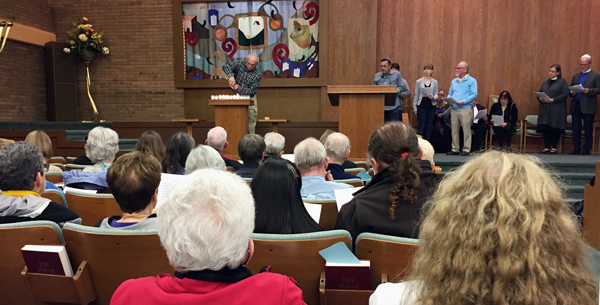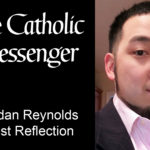
Allan Ross, the executive director of the Jewish Federation of the Quad Cities, lights a candle during the Vigil of Remembrance and Hope on Oct. 28 at Temple Emanuel in Davenport. The vigil was held in response to a mass shooting at a Pittsburgh synagogue.
By Barb Arland-Fye
Editor
Forty of us from parishes throughout the Davenport Diocese were listening to a presentation on nonviolence, unaware that a gunman at that moment was shooting to death Jewish worshipers at a Pittsburgh synagogue.
Diocesan Social Action Director Kent Ferris, fighting back tears, shared the horrible news with us later during our Social Action Saturday conference at St. Thomas More Parish in Coralville. Kent and his wife, Lori, once lived near the Squirrel Hill neighborhood where the shootings took place at Tree of Life Synagogue. “Please keep the people of Pittsburgh in our prayers. Send condolences to the Jewish leaders in your community,” Kent said, pausing to maintain his composure.
Some of my dear friends are Jewish; I received a post Oct. 27 from one of them, Allan Ross, the executive director of the Jewish Federation of the Quad Cities. He and his wife, Jill, were attending services at Tri-City Jewish Center in Rock Island, Ill., when they learned of the tragedy. Eleven people died and several others were wounded. Allan had visited Tree of Life Synagogue when he taught ROTC at Indiana University of Pennsylvania. “May those who died today in Pittsburgh be remembered as a blessing,” Allan wrote.
Another friend, Rabbi Emeritus Henry Karp, who teaches at St. Ambrose University in Davenport, posted on Facebook: “My heart is breaking as reports of the shootings at a Pittsburgh synagogue come in! WE MUST SAY ‘NO’ TO HATE!” I responded to Henry’s post: “We will never give up working for peace. We are all God’s people, created in God’s image, and we need to remind ourselves of that fact always.”
Why can’t we end the violence? What will it take for us to seek life-affirming not life-taking solutions to our challenges, fears and resentments? Those questions came to mind as I reflected on the conference I attended Saturday and the Vigil of Remembrance and Hope that I participated in Sunday night.
To end violence, we have to practice nonviolence, which involves positive, creative engagement, our presenters on nonviolence, Sister Jan Cebula, OSF, and Tom Streveler, told us. Nonviolence is a powerful force for social change. It’s a way of life and means of building global community. It’s a virtue (such as mercy and forgiveness), and a process.
The presenters asked us to reflect on where we had seen nonviolence in practice and to consider how Jesus responded when he came into violent encounters. I thought about his crucifixion: “Then Jesus said, ‘Father, forgive them, for they know not what they do.’”
But long before the crucifixion, Jesus grounded himself; he went to the desert to pray, one of the timeless tools of nonviolence.
The nonviolence presentation inspired my decision to attend the prayer vigil at Temple Emanuel in Davenport. I learned about it while in the midst of a busy Sunday. Making time to be present, that’s another tool of nonviolence, in my mind.
Powerful prayers got to the heart of the matter. One, addressed to the guilty and to the responsible said: “… What evil has robbed you of your love, your compassion, your goodness, your humanity? … What evil has robbed you of your empathy, your sense of responsibility, your decency? What self-interest do you imagine you pursue when you spread hatred?” (Based on prayers by Alden Solovy.)
“We must do more than mourn, we must act,” Rabbi Karp said during the vigil. He described hate as a disease that must be eradicated through collective effort. “We need to stand together with each other and for each other.”
Temple Emanuel Rabbi Linda Bertenthal encouraged us to take time this week to have a joyful conversation with someone with whom we profoundly disagree. Imagine if each one of us were to do that. As she said, “We are partners with God to bring ‘Shalom,’ peace among us.”
(Editor Barb Arland-Fye can be reached at arland-fye@davenportdiocese.org.)











